hankyoreh
Links to other country sites 다른 나라 사이트 링크
With climate lawsuits, youth around the globe are fighting for their future
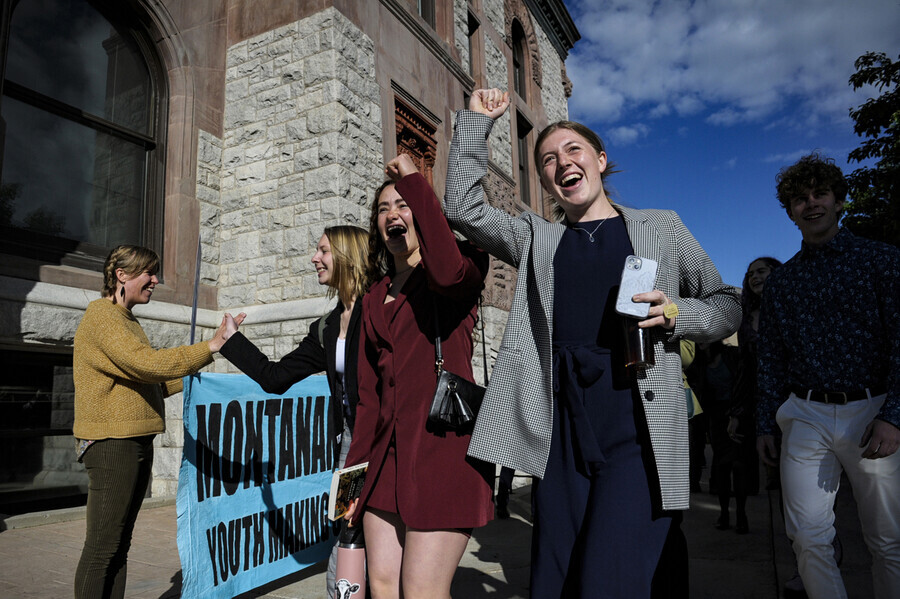
In 2020, youth in the US, Portugal, and South Korea each filed climate lawsuits against their respective governments in order to hold the countries accountable in court for ignoring or accelerating the risks of climate change.
Young people in Montana, US, won their case in August, making the future they had dreamt of three years earlier a reality, while the Portuguese youth took 32 European countries to court last month.
Youth in South Korea have also filed a constitutional complaint, but the Constitutional Court has yet to respond.
Here we hear from the youth who have declared these fights against that which threatens their future.
A future made reality: Montana youth celebrate victory“I still can’t believe that this is actually happening, and that there’s still hope.”
That’s what Grace Gibson-Snyder, 19, one of 16 plaintiffs in Montana who pulled off America’s first climate litigation victory, told a friend shortly after the Aug. 14 ruling.
Gibson-Snyder was so moved by this victory because for young people like herself, fighting climate change is about protecting their right to life.
“The climate crisis affects the next generation, us young people, more directly. We’re fully aware of the threats it brings, so we young people are determined to be agents of change,” she said during an interview with the Hankyoreh over Zoom on Sept. 21.
On March 13, 2020, Gibson-Snyder and other youth plaintiffs filed a lawsuit alleging that state policies that allowed fossil fuel development without considering the environmental impacts contributed to the climate crisis.
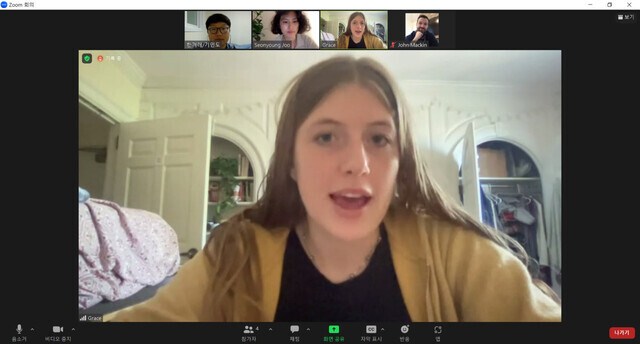
Three years and five months later, the court sided with the plaintiffs, finding that a provision of Montana law that prohibits climate impact assessments when approving fossil fuel projects violates the state’s constitution.
Montana is one of the major bases of the fossil fuel industry in the US, with 5,000 natural gas wells, 4,000 oil wells, and six coal mines.
A stipulation in Montana’s constitution that says the “state and each person shall maintain and improve a clean and healthful environment in Montana for present and future generations,” played a big role in the decision.
The provision was written into the document when it was amended in 1972.
“This shows that even 50 years ago, people knew how beautiful Montana was and how important it was for people to take care of it,” Gibson-Snyder said.
The Montana state government pushed back against the state court’s ruling, filing a notice of appeal on Sept. 29. But Nate Bellinger, an attorney with the nonprofit Our Children’s Trust, which brought the lawsuit on behalf of the youth, told the Hankyoreh, “If the state doesn’t consider the impact of climate change before licensing fossil fuel projects, we can go to court to enforce compliance.”
The near future: Portugal youth bring 32 European countries to court“We are finally seeing the light at the end of the tunnel.”
On Sept. 27, the European Court of Human Rights, based in Strasbourg, France, heard the largest climate case in history. Seventeen judges, 80 lawyers from 32 countries, including 27 European Union member states, and six Portuguese plaintiffs and their lawyers participated in the hearing.
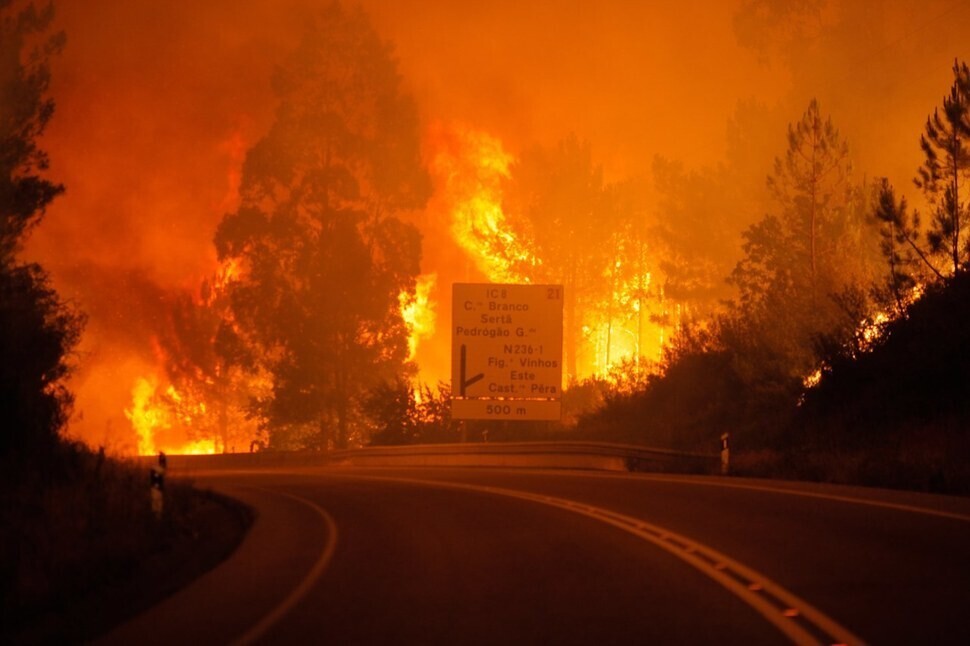
Twenty-year-old Martim Agostinho, one of the plaintiffs in the Portuguese youth climate case, shared the above comment during an online press conference with reporters from around the world on Sept. 11.
The six Portuguese young people started crowdfunding for their climate lawsuit in September 2019 in response to the 2017 wildfires that killed 66 people in the Pedrógão Grande municipality, north of Lisbon. They sued 32 European countries at the European Court of Human Rights on Sept. 2, 2020, three years after the wildfires. Another three years passed before they finally set foot in court last month.
“The climate crisis is a real danger that pervades our daily lives,” said 15-year-old André Oliveira, who is also a plaintiff in the case. “This summer’s heat wave prevented us from doing everyday activities like daily strolls, and unseasonal downpours forced us to drive to school instead of walking.”
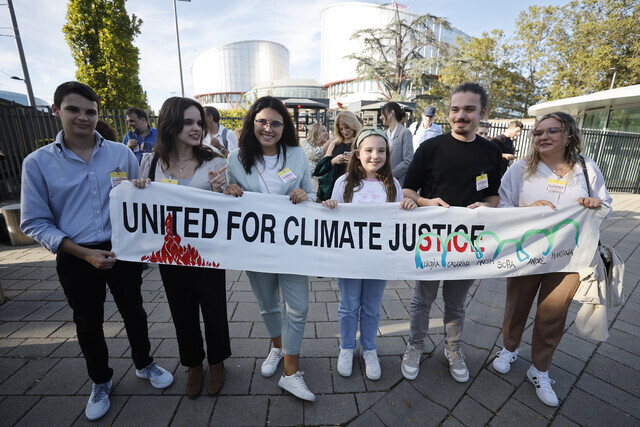
The Portuguese youth are claiming that European countries’ failure to address climate change has violated Article 2 (right to life), Article 8 (right to privacy and family life), and Article 14 (right to be free from discrimination on the grounds of age) of the European Convention on Human Rights.
The outcome of the case is expected to come next year. The European Court of Human Rights’ rulings are binding and can change a country’s policies. If the plaintiffs’ claims are accepted, the governments of 32 European countries could be ordered by the court to implement plans to reduce carbon emissions more quickly than they currently do.
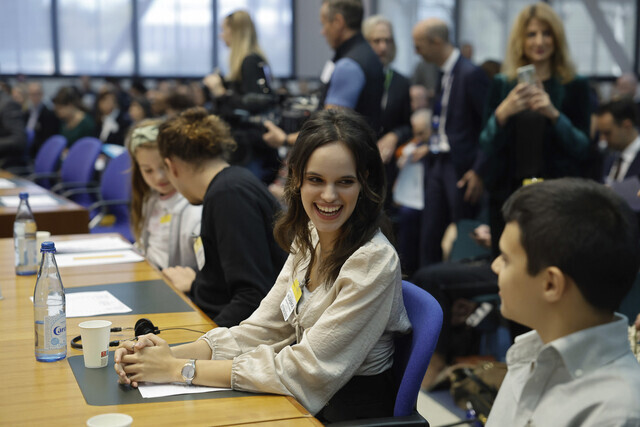
“It’s as if we’re on a boat headed toward a reef, but the captain and crew are ignoring the passengers who are begging them to change course.”
Kim Bo-rim, a 30-year-old activist with Youth 4 Climate Action, expressed her frustration in written and phone interviews with the Hankyoreh on Sept. 25.
In South Korea, a total of six lawsuits in the form of constitutional petitions have been filed with the Constitutional Court in response to the climate crisis. Among them, the first climate lawsuit was initiated by 19 activists from Youth 4 Climate Action in March 2020.
The activists argue that the greenhouse gas reduction targets stipulated in the Framework Act on Low Carbon, Green Growth, and its enforcement decree are “significantly insufficient to protect the claimants’ fundamental rights, including the right to life and the right to pursue happiness, from climate change,” and have asked the Constitutional Court to declare the law unconstitutional.
However, more than three and a half years after filing the lawsuit, they’ve yet to have their day in court. The Constitutional Court only posted a hearing progress notice through the Constitutional Court of Korea’s e-Court on March 13, 2022, two years after Youth 4 Climate Action requested a declaration of unconstitutionality, stating that the case was “under in-depth investigation due to the large number of issues and complexity of the case,” but has since not responded.
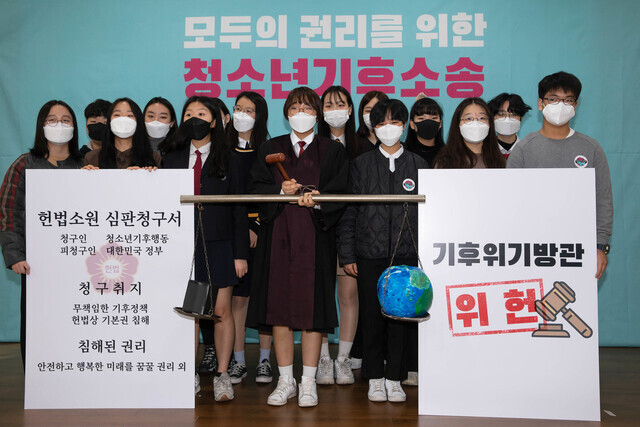
This lawsuit, and a fifth one in July led by Sunflower, a collective of lawyers advocating nuclear phase-out, in tandem with the civil society organization Political Mamas all share a common goal.
A constitutional petition filed on Sept. 20 by the environmental organization Greenpeace claims that the lack of climate disclosure, which requires companies to disclose information on climate-related risks, responses, and strategies, threatens citizens’ environmental rights.
The court has yet to make any decision on any of the six climate-crisis-related constitutional petitions. While Korean youth find hope in the cases coming out of Montana and Portugal, they also feel that time is of the essence.
“The faster we respond to the climate crisis, the less damage will be done,” said 19-year-old activist Yoon Hyeon-jeong. “Three and a half years is a considerable amount of time. We don’t have much time to stop the crisis at a level that we can come back from.”
By Key Min-do, staff reporter; Kim Jeong-su, senior staff writer
Please direct questions or comments to [english@hani.co.kr]

Editorial・opinion
![[Column] How opposing war became a far-right policy [Column] How opposing war became a far-right policy](https://flexible.img.hani.co.kr/flexible/normal/500/300/imgdb/original/2024/0702/5017199091002075.jpg) [Column] How opposing war became a far-right policy
[Column] How opposing war became a far-right policy![[Editorial] Korea needs to adjust diplomatic course in preparation for a Trump comeback [Editorial] Korea needs to adjust diplomatic course in preparation for a Trump comeback](https://flexible.img.hani.co.kr/flexible/normal/500/300/imgdb/original/2024/0702/9717199086060096.jpg) [Editorial] Korea needs to adjust diplomatic course in preparation for a Trump comeback
[Editorial] Korea needs to adjust diplomatic course in preparation for a Trump comeback- [Editorial] Silence won’t save Yoon
- [Column] The miscalculations that started the Korean War mustn’t be repeated
- [Correspondent’s column] China-Europe relations tested once more by EV war
- [Correspondent’s column] Who really created the new ‘axis of evil’?
- [Editorial] Exploiting foreign domestic workers won’t solve Korea’s birth rate problem
- [Column] Kim and Putin’s new world order
- [Editorial] Workplace hazards can be prevented — why weren’t they this time?
- [Editorial] Seoul failed to use diplomacy with Moscow — now it’s resorting to threats
Most viewed articles
- 110 days of torture: Korean mental patient’s restraints only removed after death
- 2[Editorial] Korea needs to adjust diplomatic course in preparation for a Trump comeback
- 3Nine dead in Seoul after car plows into pedestrians
- 4Korea to create dedicated population strategy ministry to combat low birth rate, aging society
- 5[Editorial] On the revival of Daehan News and theater boycott
- 6Samsung Electronics workers to go on first strike in company’s 55-year history
- 7Yoon’s prosecutors are throwing everything at the president’s opponents to see what’ll stick
- 8Japan is building a military meant for more than self-defense — and has the US to thank for it
- 9[Column] How opposing war became a far-right policy
- 10Korean scientists publish research that could be used to development coronavirus treatment